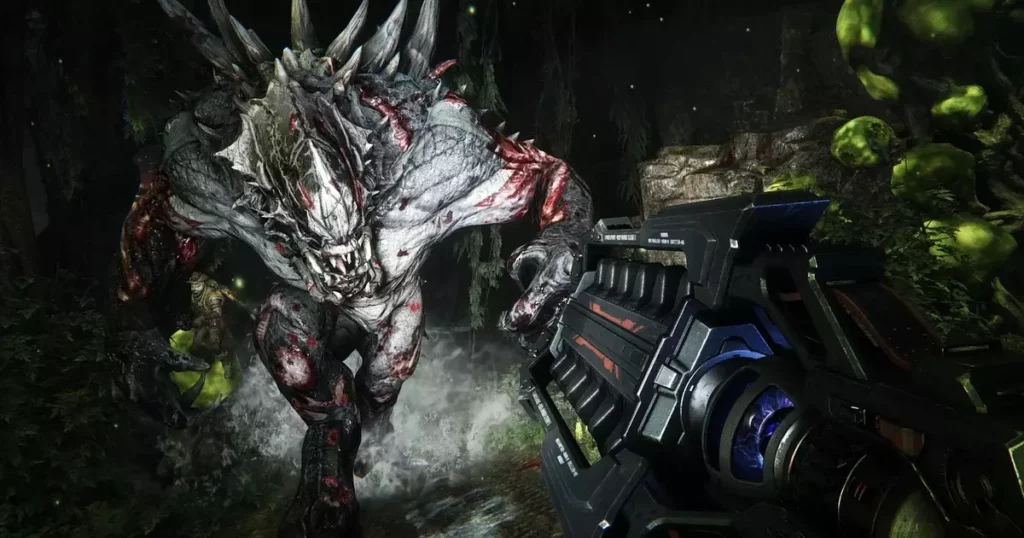Evolve represented a rare collision of innovation and ambition within the crowded landscape of multiplayer gaming. Its core premise—a predator versus a team of skilled hunters—stood out as an inventive twist on the asymmetrical multiplayer genre. Unlike typical deathmatch or team-based shooters, Evolve aimed to create a tense, strategic cat-and-mouse dynamic, where the monster player wasn’t simply powerful but adaptable and evolving. This design approach touched on primal fears, blending survival horror with competitive gameplay, and hinted at a deeper, more immersive experience.
What made Evolve particularly compelling was its unique role differentiation and the strategic depth this created. The monster was a living, breathing threat capable of transforming itself, while hunters relied on high-tech gadgets and cooperation to track, trap, and ultimately eliminate their prey. This nuanced gameplay had the potential to evolve into something more than just a cycle of grind—an intricate dance of tactics and adaptability that could have kept players hooked through meaningful progression and creative storytelling.
Corrosion Under Corporate Pressures
However, beneath its surface, Evolve became an example of how commercial interests often sabotage innovation. The game’s reliance on a controversial monetization model—pay-to-unlock content, paid DLC, and a grind-heavy progression system—eroded much of what made it fresh in the first place. While the game’s mechanics promised adrenaline-fueled tension, the financial model gradually shifted focus from player experience to profit maximization. Instead of remaining a platform for innovative gameplay, Evolve became a live service fare designed to sustain long-term revenue at the expense of the core experience.
This approach was fundamentally flawed. It stifled the game’s growth potential and alienated its most passionate fans, who craved seamless gameplay rather than constant grind or microtransactions. The artificially prolonged progression, combined with paid content, created barriers to new players and diminished the overall sense of discovery and excitement. The downfall was inevitable, as the game failed to evolve naturally, instead becoming a victim of corporate greed that prioritized short-term gains over sustainable craftsmanship.
The Unrealized Vision of Evolve 2
The cancellation of Evolve’s sequel was a missed opportunity—one that’s difficult not to regard with frustration. Concept art from the aborted Evolve 2 reveals a universe far richer and more atmospherically dense than the original game. The design sketches for an asteroid mining station named The Akhenaten evoke a haunting, space-horror aesthetic reminiscent of classics like Dead Space. Instead of endless grind, the envisioned game leaned toward narrative-driven missions, atmospheric tension, and richly detailed environments, promising to expand upon the original’s asymmetric gameplay with greater depth and storytelling.
Unfortunately, internal shifts within the studio, coupled with shifting corporate priorities, derailed this promising project mere months into pre-production. The game’s potential was sacrificed in favor of safer, more commercially predictable projects—like Back 4 Blood—that continued the grind-heavy multiplayer formula. This reveals a broader industry trend: promising ideas are often abandoned not because they lack value, but because they threaten to disrupt the bottom line.
Lessons in Innovation and Commercial Disregard
Despite its failure, Evolve’s core mechanics and design philosophies carry valuable lessons. The asymmetric multiplayer concept remains compelling, especially in an era where players are increasingly craving innovative experiences that challenge conventions. The game’s initial mechanics—blending teamwork with strategic deception—are still relevant today, underscoring the potential for asymmetric gameplay to offer fresh, engaging challenges.
More intriguing is its envisioned direction for Evolve 2—darker, more visceral horror experiences rooted in atmosphere and immersion rather than superficial grind. The design ideas around insect-like enemies and terror-inducing tactics demonstrate a desire to create a game that respects players’ intelligence and emotional investment. The industry’s obsession with monetization, however, has often prevented these ambitious ideas from reaching fruition. The tale of Evolve is a stark warning: AI and creativity are secondary if financial motives are allowed to dominate the development process.
Balancing Innovation with Sustainability
There’s an emerging recognition that groundbreaking multiplayer projects can thrive without succumbing to exploitative monetization. Franchises like Aliens vs. Predator showcase how well-crafted, lore-rich worlds maintained their appeal by focusing on tight gameplay and immersive storytelling. These titles prove that sustainable gaming experiences exist when developers prioritize quality over profit-driven trends.
For the center-right perspective—one that advocates for a balance between innovation, consumer rights, and sustainable industry growth—Evolve’s story underscores the importance of respecting player time and investment. It demonstrates that the industry must pivot from superficial, pay-to-win schemes toward genuine, creative endeavors that honor long-term engagement. The failure of Evolve’s live service model is a lesson in how greed can undermine innovation, turning what could have been a revolutionary game into a fleeting trend.
Embracing the Future of Asymmetrical Design
Looking ahead, the industry should learn from Evolve’s shortcomings. The potential for asymmetric multiplayer games to redefine engagement has yet to be fully realized. Creative concepts like space horror settings, intricate environment design, and visceral enemy mechanics could serve as fertile ground for future success—if developers are willing to prioritize creative integrity over immediate profits.
The key lies in stripping away superficial monetization and instead focusing on delivering meaningful, immersive experiences that respect players’ time and intelligence. Passionate communities around classic franchises exemplify that the appetite for innovative multiplayer experiences remains strong when nurtured with quality and purpose.
The story of Evolve is a sober reminder that revolutionary ideas in gaming often languish in corporate limbo, buried beneath the weight of commercial priorities. Yet, the remnants of what could have been—concept art, design philosophies, and untapped worlds—are a testament to the industry’s highest aspirations. If future projects are willing to learn from Evolve’s mistakes and prioritize genuine innovation, they can truly harness the transformative power of asymmetric multiplayer gaming.









Leave a Reply